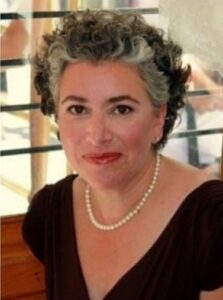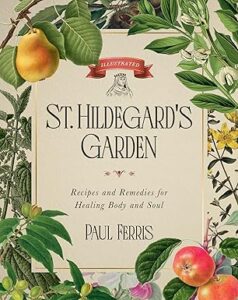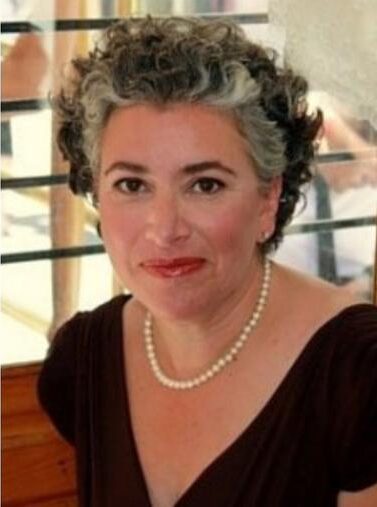Podcast: Play in new window | Download (Duration: 35:14 — 24.3MB) | Embed
Subscribe: Apple Podcasts | Spotify | Amazon Music | Android | Pandora | iHeartRadio | JioSaavn | Podchaser | Gaana | Podcast Index | Email | TuneIn | Deezer | Anghami | RSS | More

In this episode of Inside the Pages, Kris McGregor speaks with Leila Lawler about the beautifully illustrated book Hildegard’s Garden by French author Paul Frees. The conversation centers on the multifaceted life and legacy of St. Hildegard of Bingen, a twelfth-century Benedictine abbess, mystic, and Doctor of the Church. Lawler shares how her appreciation for Hildegard deepened over time—first sparked by Pope Benedict XVI’s declaration of Hildegard as a Doctor of the Church and later nourished by her daughters’ interest in Hildegard’s sacred music and by reading Victoria Sweet’s God’s Hotel.
The book itself is far more than a botanical or herbal manual. While it features stunning illustrations and practical remedies based on Hildegard’s understanding of healing herbs, it also offers a compelling biography and highlights Hildegard’s philosophy of creation, healing, and divine vitality—what Hildegard called viriditas, the greening life force. McGregor and Lawler explore how Hildegard’s holistic view of the world was deeply rooted in Benedictine spirituality, which integrated prayer, work, hospitality, and care for the whole person. They also discuss how Pope Benedict XVI saw Hildegard—and other mystics such as Catherine of Siena, Teresa of Ávila, and Julian of Norwich—as key voices in reviving a richer, more integrated theology, especially one attentive to the mystery and beauty of God’s presence in creation. The podcast affirms Hildegard’s relevance not only for her time but especially for ours, where a recovery of reverence for creation and the wisdom of the saints is urgently needed.
Discerning Hearts spiritual reflection questions:
- How does Hildegard of Bingen’s concept of viriditas invite us to see God’s life-giving presence in creation and in our own healing?
- In what ways can Hildegard’s integration of faith, science, and art inspire a more unified approach to our spiritual and physical well-being?
- How might Benedictine hospitality, as practiced by Hildegard, reshape the way we care for those who are suffering in our communities?
- What can we learn from Pope Benedict XVI’s decision to highlight women mystics like Hildegard as vital contributors to theology and Church renewal?
- How does reading Hildegard’s letters give us a deeper understanding of her humility, obedience, and spiritual authority?
- In what ways does Hildegard’s view of the cosmos challenge the modern tendency to separate God from His creation?
- How can Hildegard’s practical wisdom about herbs, rest, and natural rhythms inform how we care for ourselves and our families today?
- What role does beauty—in nature, music, and daily life—play in leading us toward a deeper knowledge and love of God?
 You can find the book here
You can find the book here
From the book description:
Hildegard of Bingen (1098–1179) was a mystic and scholar who chronicled more than six hundred pages of visions, wrote cantatas, and even devised her own language. She authored The Book of Divine Works, Causes and Cures, and Scivias and corresponded with the greatest intellectuals, theologians, and royals of her time.
As a pioneer of European phytotherapy, Hildegard described and cataloged hundreds of ingredients from plant, mineral, and animal origins. Her recipes, remedies, nutritional advice, and holistic view of the human being are as valued and appreciated today as when she developed them nearly a thousand years ago.
This book faithfully applies Hildegard’s pioneering thought to everyday living in our time. In these potent pages, you will find the medicinal properties of essential herbs as well as how to identify, utilize, and cultivate them. You will also learn:
- “Hildegard’s elixir” for curing common ailments
- Ways to include delicious herbs in your dinner and dessert recipes to fortify your health
- The herbs that will help you relieve forgetfulness and ease muscle tension
- Effective treatments for nervous, digestive, circulatory, respiratory, and hormonal illnesses
- Recipes for preparing everything from breakfast dishes and soups to medicinal wines, teas, poultices, ointments, oils, plasters, and eye drops
- Which “herb of the angels” is used to treat anxiety, fatigue, and much more
Additionally, you will discover the most favorable environment for growing the plants most heartily recommended by Hildegard, and step-by-step instructions on how to develop your own spiritually organized and fruitful garden plan.


